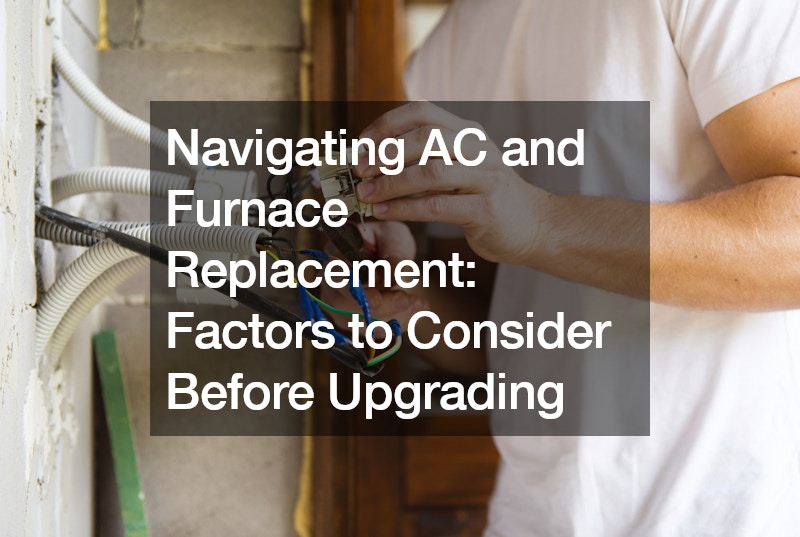

Replacing your air conditioning (AC) and furnace units is a significant decision for homeowners, influenced by various factors. Understanding when to opt for replacement and the consequences of delaying it can help you make informed choices about upgrading your HVAC systems. When to Consider Replacement
Age of the Unit: The age of your AC and furnace is crucial in determining whether replacement is necessary. Most manufacturers suggest that these systems have a lifespan of around 10 to 15 years. If your units are nearing or have surpassed this timeframe, it might be time to consider a replacement.
Additionally, newer models often come with extended warranties and improved efficiency features, making them a worthwhile investment for long-term savings and comfort.
Frequent Repairs: Continuous repairs could indicate that the system is reaching the end of its lifespan. Investing in repairs may become more costly than opting for a replacement unit. Moreover, modern HVAC systems are designed to be more durable and require fewer repairs over their lifespan, providing homeowners greater reliability and peace of mind.
Declining Efficiency: Aging systems tend to become less efficient, resulting in increased energy consumption and higher utility bills. If you notice rising energy costs despite regular maintenance, upgrading to a more energy-efficient model might be time. Upgrading to a high-efficiency HVAC system reduces your carbon footprint and qualifies you for potential tax credits and rebates, offering additional savings on installation costs.
Lack of Comfort: An aging AC or furnace may struggle to maintain consistent temperatures, leading to discomfort and inconvenience. If you find yourself constantly adjusting the thermostat without satisfactory results, it could signal the need for a replacement. Moreover, modern HVAC systems offer advanced features such as zoning capabilities and humidity control, allowing homeowners to customize their indoor environment for optimal comfort year-round.
Obsolete Technology: Older HVAC systems lack advanced features found in modern models, impacting performance and indoor air quality. Upgrading to a newer system can offer improved comfort and energy efficiency through programmable thermostats and advanced ventilation. Additionally, newer HVAC systems are compatible with smart home technology, allowing homeowners to monitor and control their heating and cooling systems remotely for added convenience and energy savings.
Health and Safety Concerns: Malfunctioning or outdated furnaces may pose health and safety risks such as carbon monoxide leaks or poor indoor air quality. If your system exhibits signs of deterioration or safety hazards, replacement is crucial for your family’s well-being. Newer HVAC systems feature enhanced safety features such as automatic shutoff valves and advanced air filtration systems, protecting your home and loved ones from potential hazards.
Consequences of Delaying Replacement
Increased Energy Bills: Aging systems consume more energy, leading to higher utility bills. Delaying replacement can result in inefficient heating and cooling, contributing to escalating energy costs. Upgrading to a high-efficiency HVAC system can significantly reduce energy consumption and lower monthly utility bills, providing long-term savings and financial stability.
Decreased Comfort: Outdated HVAC systems struggle to maintain consistent temperatures, causing discomfort and inconvenience for occupants. Delaying replacement means enduring subpar comfort until the system fails completely. Upgrading to a modern HVAC system offers improved comfort through enhanced temperature control and quieter operation, creating a more enjoyable indoor environment for you and your family.
Costly Repairs: Continuing to use an aging HVAC system often leads to frequent breakdowns and costly repairs. Over time, repair expenses can exceed the cost of investing in a new, reliable unit. Upgrading to a newer HVAC system eliminates the need for frequent repairs and provides homeowners with peace of mind knowing that a comprehensive warranty covers their system.
Health Risks: Older furnaces may pose health hazards like carbon monoxide leaks or poor indoor air quality. Delaying replacement increases the risk of these health issues, compromising your family’s well-being. Upgrading to a modern HVAC system with advanced air filtration technology can improve indoor air quality and reduce allergens, pollutants, and airborne pathogens, creating a healthier living environment for you and your loved ones.
Reduced Property Value: An outdated HVAC system can detract from your home’s value, affecting its resale potential. Prospective buyers may view aging AC and furnace units as liabilities, lowering the overall property value. Upgrading to a modern HVAC system enhances your home’s appeal to potential buyers and increases its market value, ensuring a higher return on investment when it’s time to sell.
Environmental Impact: Older HVAC systems are less energy-efficient and contribute to higher carbon emissions. Upgrading to newer, eco-friendly models reduces your home’s environmental footprint and promotes sustainability. By investing in a high-efficiency HVAC system, homeowners can reduce their carbon footprint and contribute to a cleaner, healthier planet for future generations.
Warranty Expiration: Most HVAC warranties have a limited lifespan, and continuing to use an outdated system after the warranty expires exposes you to the full cost of repairs and replacements. Upgrading to a new HVAC system ensures you’re covered by a comprehensive warranty, providing financial protection and peace of mind for years to come.
Technological Advancements: Newer HVAC systems incorporate advanced technologies that enhance performance, comfort, and energy efficiency. Delaying replacement means missing out on these innovations and their associated benefits. Upgrading to a modern HVAC system allows homeowners to take advantage of cutting-edge features such as smart thermostats, variable-speed motors, and advanced diagnostics, improving system performance and reducing energy costs over time.
Knowing when to opt for AC and furnace replacement is crucial for maintaining comfort, efficiency, and safety in your home. Ignoring signs of aging or neglecting necessary upgrades can result in higher energy costs, decreased comfort, and potential health risks. Investing in modern, energy-efficient HVAC systems ensures optimal performance, lower utility bills, and greater peace of mind for you and your family.
.



